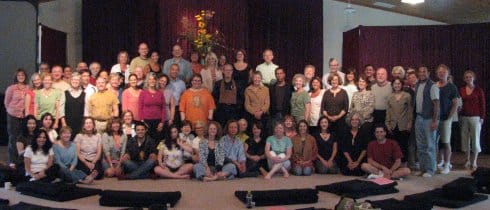Four great teachers from across Buddhist traditions. 80 participants. What happens when you get them all together to explore happiness as Buddhists might see it? James Kullander has the report from what proved to be a very special weekend.
One happy crowd — we thank them all for making “Discovering Happiness” such a joyful and meaningful experience.
It’s Sunday afternoon and Omega Institute’s and Lion’s Roar cosponsored weekend gathering, “Discovering Happiness,” has just ended. Before I head home, tired but elated, I check my email and read in the Writer’s Almanac e-newsletter about the birthday of the English poet Philip Larkin, who said, “I think writing about unhappiness is probably the source of my popularity, if I have any. After all, most people are unhappy, don’t you think?”
That quote strikes me, since I have just spent the weekend exploring the nature of happiness and how to find it. Frankly, I do think most people are unhappy. That’s the bad news. The good news is that our happiness is entirely up to us. As I listened to the teachers over the weekend, it became increasingly evident that genuine happiness is always available to us and cannot be taken away. That’s because our happiness is dependent on nothing outside us. What we need to do is welcome all our experiences with a sense of curiosity and self-awareness, to even be a friend to our experiences no matter what they are, even if — or especially if — things don’t go our way.
This line of thinking — that happiness is individually and collectively available all the time — is not from some pop song or greeting card. Rather, it is a fundamental tenet of Buddhism. I first heard this shocking message in 1993, during my first Buddhist meditation retreat in Nepal, and I keep hearing it in every Buddhist retreat I go on, in every Buddhist book I read. Somehow I forget, so it helps to get a refresher course; it seems every time I hear Buddhist teachings I feel as if I am hearing them for the first time. Perhaps that’s because my life is always changing, always ripe for something new and different. What did not interest me, or what I did not understand last week, might interest me now—and be completely comprehensible, like I’d known it all along.
The other three teachers who offered their wisdom to the program’s 80 participants were Sharon Salzberg, Gaylon Ferguson, and Barry Magid. The topic of happiness, like the two previous themes — Fear and Fearlessness (2007) and Mindfulness, Love and Relationship (2008) — was chosen because, according to Shambhala Sun editor Melvin McLeod, Buddhism offers “both practical, helpful advice for our day-to-day lives, as well as profound insight into the nature of realty and our lives as human beings in addressing these questions.” After all, McLeod told the crowd, the starting point of Buddhism is the first Noble Truth, the truth of suffering. The fruition of Buddhism, he said, is the end of suffering. “Thus we can say that Buddhism is entirely devoted to the question of human happiness. That this is its raison de’être,” he said.
Lovingkindness does not deny the suffering and pain of the world, she said, but it gives us the energy to sustain the effort to be present in all manner of difficult situations in which we might find ourselves. It connects us to the resiliency of the human spirit.
I have saved Gaylon’s opening remarks till the end here, because they seem to be an apt way to close, a way to take the teachings of the weekend with us long afterward, and for me to share them. All beings want to be happy, he said, quoting the Dalai Lama. This is an element of our awakened nature, and it is inherently and fundamentally a good impulse.
Thing is, he said, we find ourselves doing things that do not lead to the happiness of others or ourselves. These activities or emotions or thoughts are like clouds that come between us and the sun, our innate goodness. The teachings of the Buddha, Ferguson said, have to do with ways that remove those clouds. And we can train ourselves to remove the clouds. Our awakened, happy nature is the sun, and we can learn how remove what covers that nature.
Which is what the word “discover” means. It means to uncover, to expose to view anything that was previously covered up. So when we discover our happiness we are uncovering what it is inherently, always within us.
